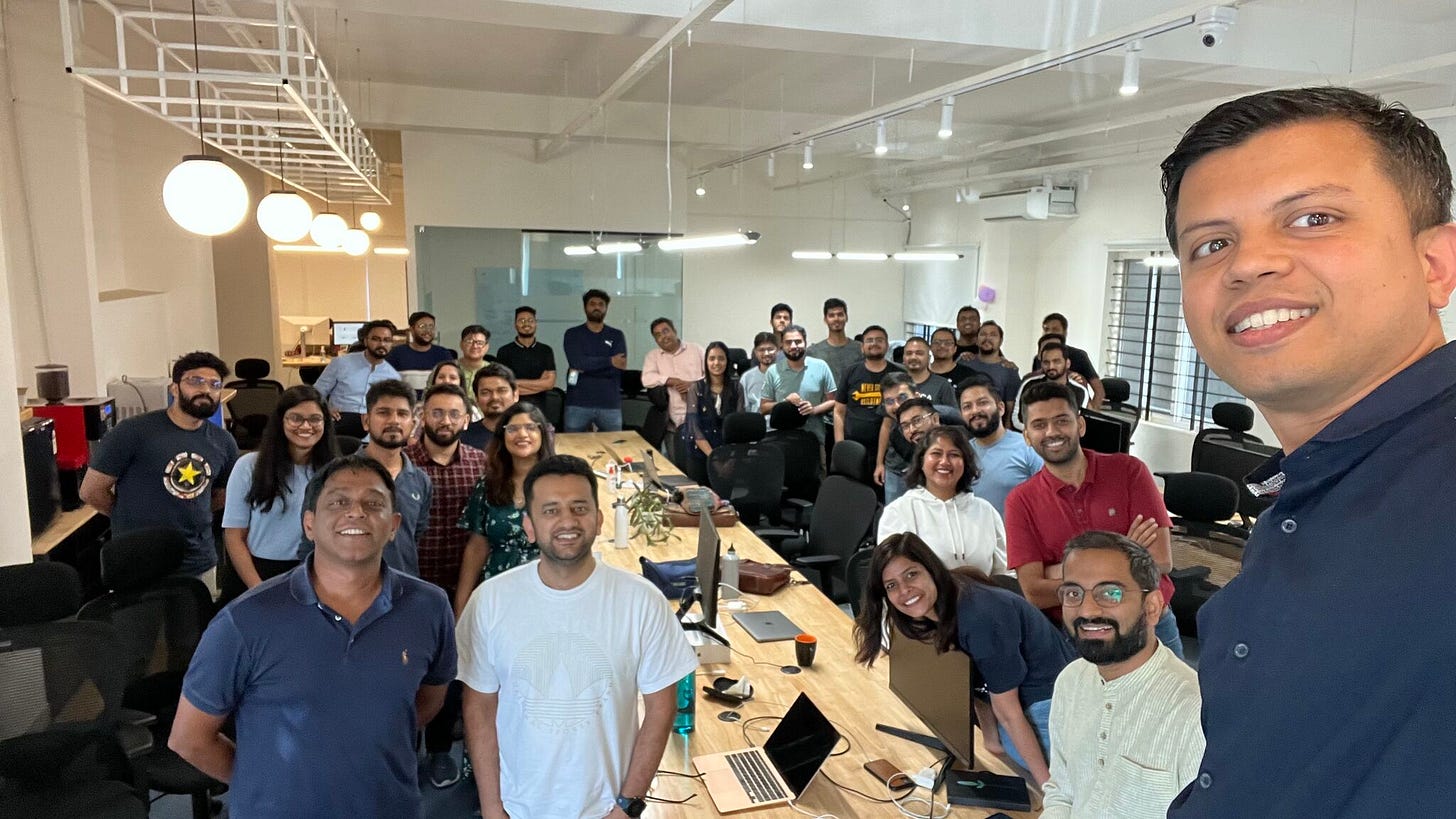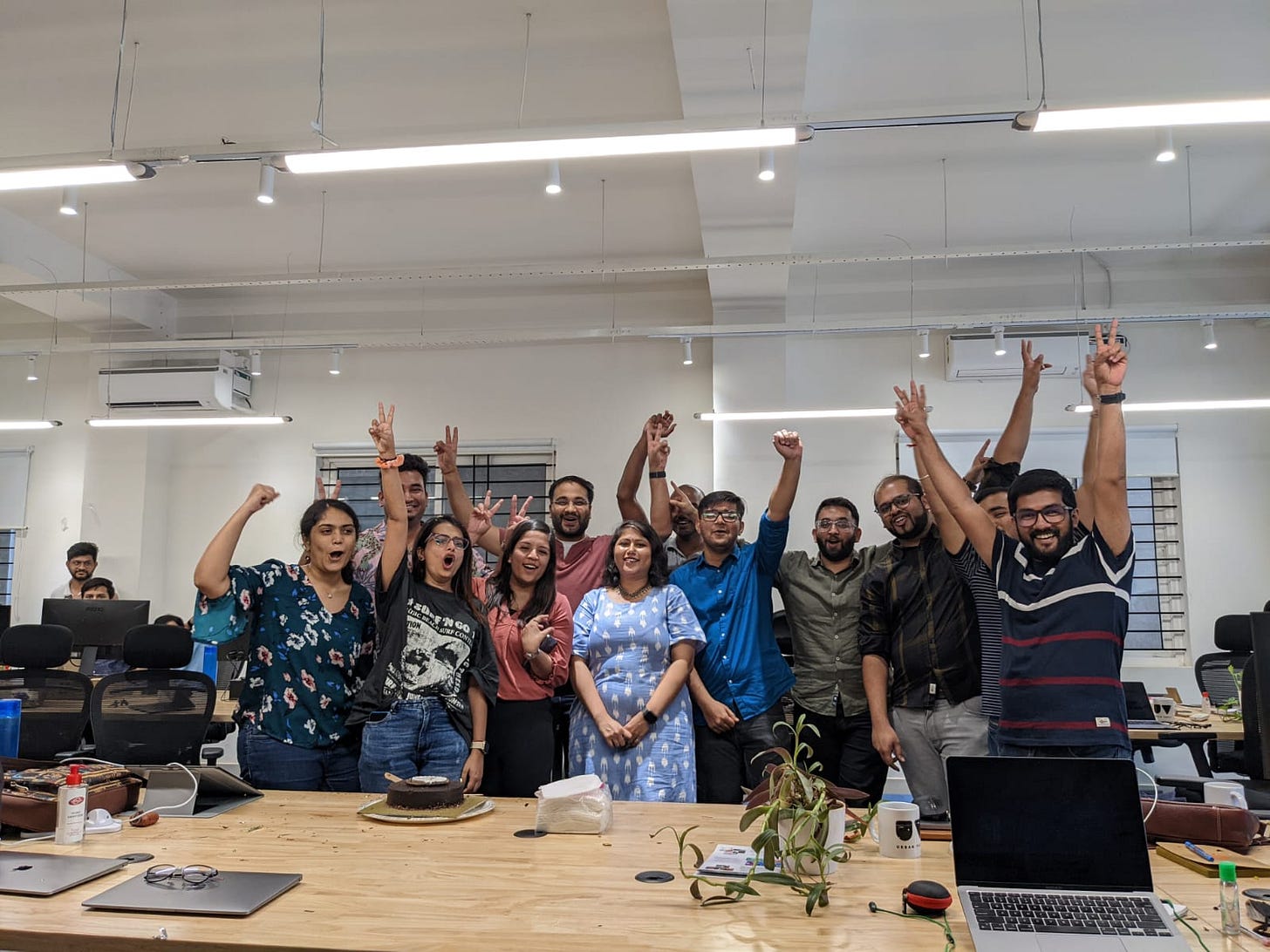A chat to remember! 💬
Lessons from our in-house fireside chats (tech, advertising, product) micro-packaged for the community.
‘BLUE SKY HOUR’: Fireside chats with industry veterans ⌛️
Blue Sky thinking involves creativity with no limits and opening your mind to fresh perspectives. When we were to title our series of fireside chats, we named it after the exact method we used to come up with its name - BLUE SKY HOUR.
Blue Sky Hour with KK Kumar (former Google exec)
KK is a Business Operations and Product leader with two decades of experience working with global enterprise giants. As someone who has been closely associated with ad revenue leader Google, KK shared his learnings with us on topics ranging from advertising, industry trends, working with enterprises, global expansion, and more.
Key insights from his session:
Digital advertising space - India’s digital advertising market is ~$4B and ~50% of it is Google. Digital advertising is growing at ~30% each year. At the pace, there is both a massive opportunity but a growing challenge to stand out in the crowd. Ads used to be intent-based and are now moving to influencing users throughout the buying journey - awareness, interest, desire, action.
Role of visuals in ads - Search ads will continue to dominate the bottom of the funnel. Everything above it needs to move buyers to the bottom layer. And this will largely be driven by visuals like banners and videos.
Impact that Rocketium can bring in advertising - Ad platforms will rarely have opinions on what visuals should look like. Even if they do, they will optimize for their platform. What gives a platform like Rocketium an advantage is that it can optimize for all platforms and give brands and agencies a single place for campaigns across channels.
Need for creative analytics - Creative analytics is a combination of art and science. It is a tough enough nut to crack that large enterprises build dedicated teams for creative analysis. Doing this as a platform is extremely powerful so everyone can get the same powerful insights without building a large team.
Blue Sky Hour with Manoj Agarwal (Co-founder, DevRev)
Manoj is a Product and Engineering leader who has scaled teams and built world-class products multiple times. Before DevRev, he scaled the engineering team at Nutanix from 50 to 7,000+. Since 2020, he has been building an enterprise developer CRM.
Key insights from his session:
Engineering should not be seen as a back-office function. They are the ones building the product and need to be on the forefront alongside customer-facing teams. Bringing developers closer to the customers solves most of the problems.
The distance between business and product teams needs to be eliminated. Everyone needs to have equal access to information to make the right decisions.
Developers often build a mindset that the companies that need marketing and sales teams do not have a good product. That is not true. Marketing, Product, Sales, all need to complement each other to create a successful business.
Engineering teams need to ask themselves the below questions. If they have a clear answer for each of these, it means you’re doing the right things at the right place.
Am I getting challenged enough?
Am I surrounded with smart people?
Is my work creating an impact?
Advice to engineers-turned-managers - Find 70%+ time to code. You will also realise that it is not just about you, you have to empower others too.
Signs of a potential leader in the engineering team - These folks are interested in the problem and how customers use it. They keep coming back to customers and the impact the product can have on them.
Rapid fire with Rocketium’s first Senior Product Manager - Gopal Chandak
One question that all aspiring young product managers should ask themselves.
“WHY” should be at the centre of everything that a Product Manager is doing. There are so many problems in the world. Why do you want to solve this one first?
Do Product Managers need to code or should they know how to code?
Knowing the code helps but isn’t a blocker. Coding isn’t a necessary skill that they should have. But, if you do, it complements your work because you’re able to empathise with the developers and ask the right questions.
Is there a difference between how a B2B vs. B2C Product Manager would work?
Yes, given that the expected response time at both of these setups is different, the speed of shipping and pace of decisions vary. However, this gap is narrowing now.
Do younger teams even need a Product Manager?
There are different set of people involved in the ecosystem where we build products. Solution to a technology problem is often not as easy as business teams perceive it to be. Similarly, a developer may not always be able to understand the business impact of their solutions. This amalgamation of what needs to happen and why it needs to happen is why a Product Manager exists.
Most common mistakes that budding Product Managers make.
- Starting to build the first solution that comes to mind
- Falling in love with your solution
- Dictating the solution instead of reaching it naturally
Top competencies that you look for while hiring a Product Manager.
- Analytical thinking and problem-solving
- Optimistic attitude and clear communication
- Thriving in ambiguity
Why Rocketium?
I would attribute my decision to two reasons - Space and People. Based on my previous experience, I am confident about the power held by communication and personalisation. The people aspect had a significant contribution to my decision. The interviews weren’t an evaluation but a two-way conversation. I was also sold on the fact that a company which invests so much in infusing product and business knowledge even to its recruiters is sure to make it big!
Something has broken, and we’re not sorry for it 🤑
It was a fiery end to Q2 as our customer success team went on to record break their own results. It started in the month of May when the team brought in highest expansion revenue in one month, in the history of Rocketium. Before we could celebrate the win, they had another achievement to top themselves. As the quarter ended, the team closed with a massive 143% expansion revenue from the enterprise customers, all in the month of June itself.
Now you know why we aren’t sorry? 😉





